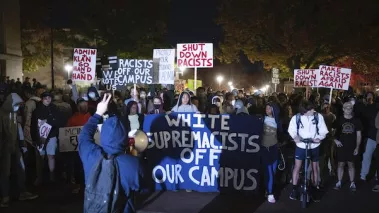Table of Contents
FIRE urges transparency, action from Penn State after Uncensored America event cancellation

Photo by Zach D Roberts/NurPhoto via AP
Penn State cancelled an event featuring Proud Boys founder Gavin McInnes and pundit Alex Stein, citing threats of escalating violence, on Oct. 24, 2022.
After weeks of standing by its First Amendment obligations in the face of immense pressure to deplatform a controversial student-hosted comedy show featuring Proud Boys founder Gavin McInnes and conservative comedian Alex Stein, Pennsylvania State University ultimately canceled the event just before it was set to begin.
Amid reports that a few protest attendees were involved in skirmishes that included spitting and pepper spray, the university told the hundreds of protesters outside the event to disperse, citing “the threat of escalating violence.”
FIRE wrote Penn State today asking it to reveal the threats deemed serious enough to warrant canceling the event, especially given the reported failure of university police to arrest anyone engaging in violence — though in at least one instance prior to the start of the event (documented in this video at 55:15), an individual appears to spray mace into a group of protesters as police looked on. This information will help us understand whether Penn State met its dual obligation to use the least speech-restrictive means to ensure student safety while protecting speakers’ and protesters’ expressive rights.
Penn State is aware of its obligations as a public university bound by the First Amendment. Even as many within and outside the campus community criticized the university for allowing Uncensored America to host the event, Penn State continuously cited its commitment to protecting expressive rights for refusing to yield to critics. However, the university ultimately failed to meet its obligations if the event was canceled without a substantial threat of violence or if violence against attendees or protesters went unchecked by police.
Penn State must respond to isolated incidents of violence by removing lawbreakers and allowing peaceful protests and scheduled events to continue. Allowing threats of violence to shut down an expressive event capitulates to the “heckler’s veto.” It also provides cover for administrators who might wish to shut down events for political reasons, pointing to vague, unsubstantiated “threats” as their rationale. As we said in our letter:
While authorities may take steps to advance legitimate public safety concerns, that authority is not endless, and must be the “least restrictive with respect to” expressive rights of the speaker. Otherwise, a “heckler’s veto” will prevail, and authorities would have broad authority to limit speech under dubious security rationales, as actions taken to limit speech “will nearly always be susceptible to being reimagined and repackaged as a means for protecting the public, or the speaker himself, from actual or impending harm.”
FIRE is equally concerned that documented incidents of violence against peaceful protesters and a speaker reportedly went unmet by police intervention. Penn State must train its police to appropriately address threats to First Amendment protected activity, including peaceful protest.
Universities must act when there are credible threats of violence, but in situations involving expressive rights, they must do so using the least speech-restrictive means, with complete transparency.
We ask Penn State to detail the circumstances that led to last night’s cancellation, so students can have confidence that their rights to host expressive events — and to peacefully protest them — remain protected on campus.
FIRE defends the rights of students and faculty members — no matter their views — at public and private universities and colleges in the United States. If you are a student or a faculty member facing investigation or punishment for your speech, submit your case to FIRE today. If you’re faculty member at a public college or university, call the Faculty Legal Defense Fund 24-hour hotline at 254-500-FLDF (3533).
Recent Articles
Get the latest free speech news and analysis from FIRE.

VICTORY: Court vindicates professor investigated for parodying university’s ‘land acknowledgment’ on syllabus

Can the government ban controversial public holiday displays?

DOJ plan to target ‘domestic terrorists’ risks chilling speech

